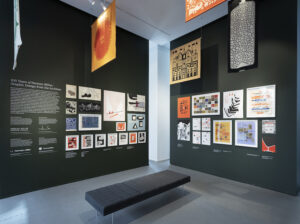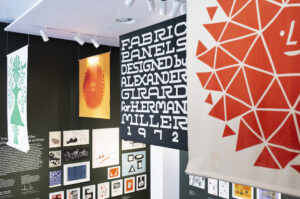Celebrating 100 Years Of Herman Miller
To launch the celebration of the 100th anniversary of its brand name, Herman Miller has taken a deep dive into its rich archive of graphic design to bring its story of design authorship and cultural influence to life. Throughout its history, Herman Miller has worked with many graphic designers and artists who came to define the look and feel of their respective eras. This visual journey—which begins in Milan and will travel to Chicago for MillerKnoll Design Days in June—celebrates their work, and the boldness, rigor, and joy innate to the brand.
Starting in the early modern era with the hiring of Gilbert Rohde in 1930 as Herman Miller’s first design director, founderD.J. De Preemade a pivotal step in transitioning the company from traditional to modern design. Rohde’s architectural training and Bauhaus education brought a new rigor to Herman Miller’s traditional furniture, while his wife Peggy Rohde designed marketing materials that depicted and highlighted the new direction.
Joining Herman Miller in 1945, outsize personality George Nelson cemented both storytelling and design partnerships—with the Eames Office, Alexander Girard, and others—as essential parts of the Herman Miller brand. Under Nelson’s design direction, graphic pioneers like Irving Harper (responsible for the “free” M in Herman Miller’s logo to this day) and Tomiko Miho flourished.
Coinciding with the Pop Art movement of the 1960s and the artistic liberation of the 1970s,a shared spirit of idealism and playfulness carried through from the Swiss-influenced, Helvetica-heavy tenure of designer John Massey to his protégé, Steve Frykholm, whose exuberant Summer Picnic series came to typify the company’s graphic identity throughout the 1970s.
In the 1980s and ’90s, Barbara Loveland and Linda Powell steered the company through a postmodern period of design leadership. And as Herman Miller increased its international footprint, its graphics reached every corner of the globe, from traveling exhibitions to a system of illustration depicting a new theory on harmonious workplace environments called Living Office.
Finally, one cannot discuss graphics at Herman Miller without Alexander Girard, founding director of the company’s textile division. Throughout his career, Girard used graphics to create motifs with meaning, and his pattern language would reach its apex in the early 1970s with a series of Environmental Enrichment Panels—a selection of which will be on display in the Milan showroom exhibition.
During Salone, Herman Miller is making available for sale limited-edition prints of the John Massey-designed Eames Soft Pad Group poster. Originally produced in 1970, this piece is representative of the sharply defined style Massey brought to Herman Miller’s communications. Printed at the original 32″ x 48″ (91.44 x 121.92 cm) size, the prints are hand numbered in an edition of 500. The print embodies this statement from Massey: “I always tried to build into each piece a life beyond the purpose for which it was created.
To commemorate the brand’s centenary, Phaidon is also releasing a special edition of its bestselling monograph Herman Miller: A Way of Living. With a new clothbound cover and updated timeline, this unmatched collection of brand stories, historical artifacts, documents, and photographs provides an expanded view of Herman Miller’s history.
To see the exhibition in person during Salone, visit the Herman Miller showroom in Milan at Corso Giuseppe Garibaldi 70 in the Brera Design District from Tuesday, April 18 to Saturday, April 22 from 9 a.m. to 6 p.m.









 Email: info@cyber-gear.com
Email: info@cyber-gear.com